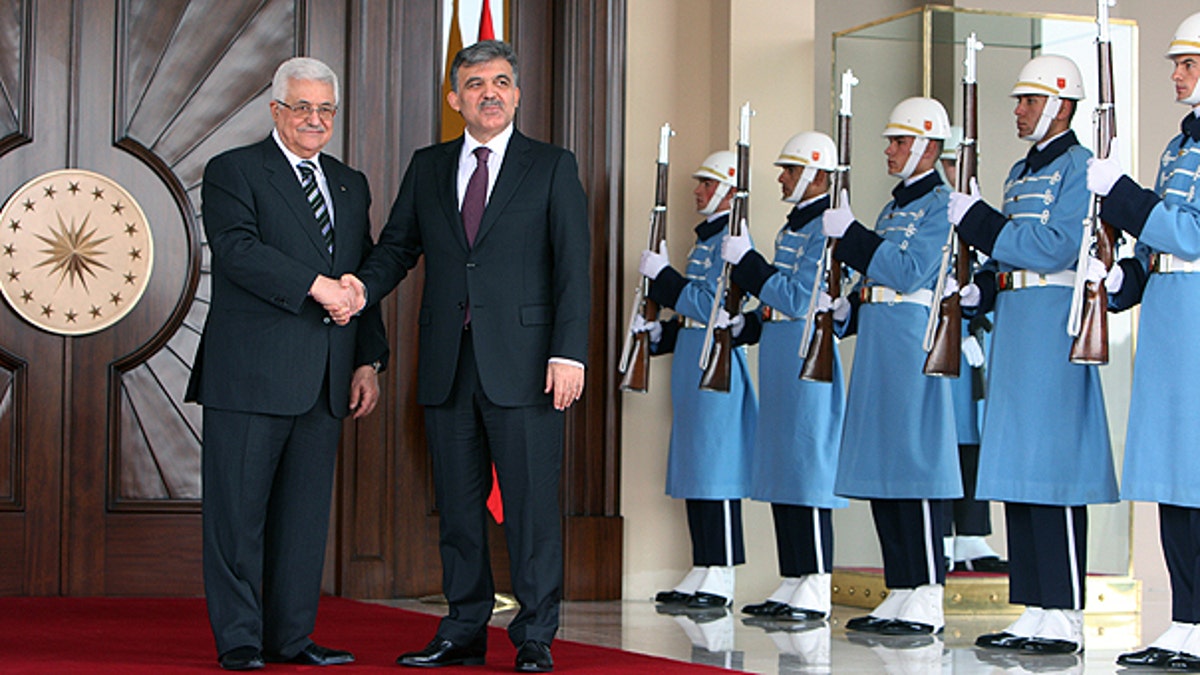
Palestinian leader Mahmoud Abbas, left, and Turkish President Abdullah Gul pose for media cameras before their meeting at the Cankaya Palace in Ankara, Turkey. (AP)
RAMALLAH, West Bank – The Palestinians' Plan B — an alternative to the elusive peace deal with Israel — is gradually taking shape: convince as many countries as possible to recognize a Palestinian state in the West Bank, Gaza and east Jerusalem, and use that to lobby the United States not to veto recognition by the U.N. Security Council.
The issue suddenly became more urgent late Tuesday when U.S. officials said they had abandoned efforts to get Israel to reinstate a West Bank settlement construction slowdown, concluding that was not the best way to restart the talks. The Palestinians have said they would not resume negotiations without construction curbs.
With efforts deadlocked, Brazil and Argentina have recognized "Palestine," expected to be followed by Uruguay next month, the result of what a senior Palestinian official described as months of campaigning. Palestinian President Mahmoud Abbas said he is now setting his sights on Europe and would ask increasingly influential Turkey to serve as a go-between. Abbas was in Turkey on Tuesday.
It might be tough to persuade Western countries to take such a step, as long as there is still a chance the U.S. can restart negotiations on creating a Palestinian state alongside Israel.
Israel warned Tuesday that recognizing a state of Palestine without waiting for negotiations only hurts peace efforts.
Talks hit a roadblock in September, shortly after their launch, when Israel refused to extend a moratorium on housing starts in West Bank settlements.
In recent weeks, the Obama administration tried to persuade Israel to agree to a 90-day extension, but two U.S. officials said Tuesday those efforts have been abandoned. Under the deal, it was to have been a one-time extension and the U.S. would not have pressed for a further renewal.
While Abbas emphasizes that establishing Palestine through negotiations remains his preferred choice, he has been pursuing alternative routes to statehood with increasing vigor. The Palestinians say that underlying their need for a Plan B is the fear that they won't be able to reach a peace deal with Israeli Prime Minister Benjamin Netanyahu.
The option most frequently raised in recent months is to seek U.N. recognition of a state on the lands Israel captured in the 1967 Mideast war — the West Bank, Gaza and east Jerusalem.
Winning a majority in the U.N. General Assembly would presumably be an easier task, but obtaining recognition by the U.N. Security Council would be the bigger prize, yet much harder to obtain because of a likely U.S. veto. Washington has traditionally blocked measures that Israel considers hostile.
Anticipating such difficulties, the Palestinians have been trying to improve their leverage, including by lobbying individual countries to recognize a Palestinian state in 1967 borders, said Nabil Shaath, a senior Abbas aide.
Brazil led the way in Latin America by granting recognition on Friday. Argentina followed on Monday, and Uruguay is to do the same in January. Shaath said Paraguay, Chile, Peru, Ecuador and Salvador are also possibilities, though to varying degrees, he said.
With each additional country recognizing "Palestine," it would be more difficult for the U.S. to use its veto if and when the Palestinians seek the nod from the Security Council, Shaath said.
Such recognition would not change much on the ground, but it could raise the Palestinians' international standing and enshrine their demand that the 1967 lines must serve as the basis for drawing Palestine's borders. Netanyahu opposes withdrawal to the pre-1967 lines, though he says he remains committed to negotiating a partition of the land.
Israeli officials were split Tuesday on the potential impact of foreign endorsements of Palestine.
Deputy Foreign Minister Danny Ayalon said the recognition by Brazil and Argentina had no practical meaning. However, Foreign Ministry spokesman Yigal Palmor said unilateral recognition is "disappointing and damaging" and violates previous peace deals.
Abbas, meanwhile, is going after other countries. Earlier this week, he said he would seek Turkish support for winning recognition from countries in western Europe, and that he planned to hand Turkish leaders a list of nations he needed help with.
On Tuesday, after a joint news conference with Abbas in Ankara, Turkish President Abdullah Gul seemed supportive. He said that while Turkey supports negotiations, they can only resume once Israel freezes settlement construction.
Turkey wants "everyone to recognize the state of Palestine," with east Jerusalem as a capital, Gul said, though he did not make clear whether this should be done outside the framework of negotiations.
The European Union is supporting U.S. efforts to restart negotiations, though some European states have upgraded Palestinian representation in an apparent show of support.
___
Dalia Nammari in Ramallah, Daniel Estrin in Jerusalem and Erol Israfil in Ankara, Turkey, contributed to this report.
